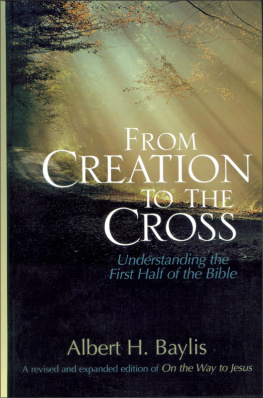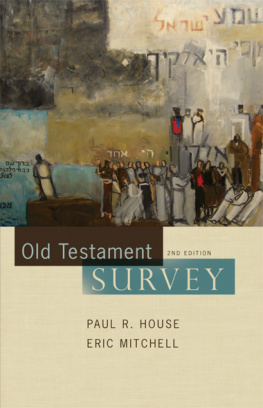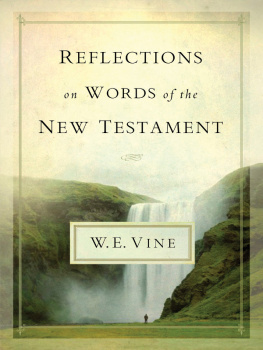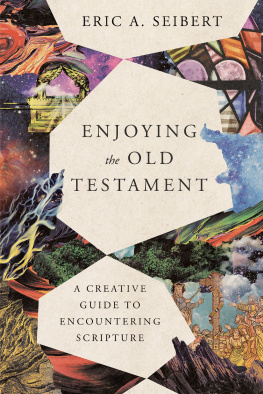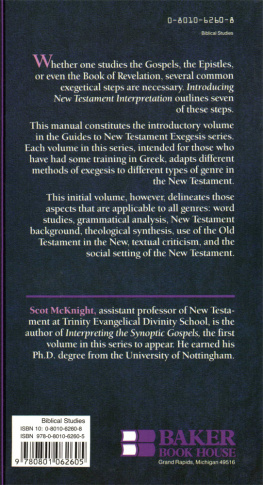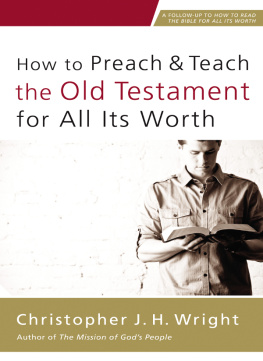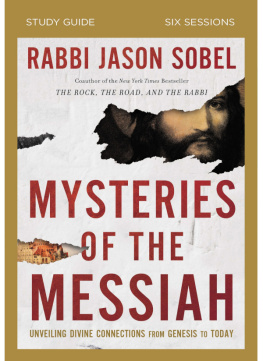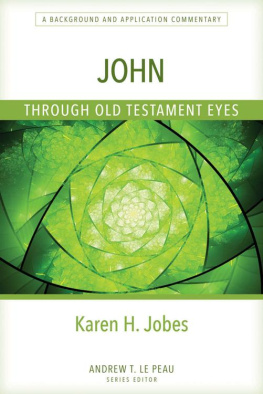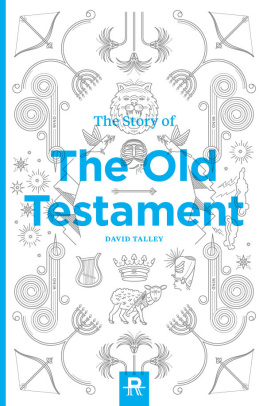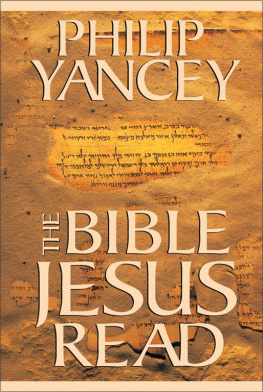This book is dedicated to
AL III
Al, you are my Hero
Why do you want to write a book?
A student of mine caught me up short with that question as we returned from Christmas break. As usual, I had spent the entire vacation writing. Why did I want to write a book? And why this book?
I have heard many a preacher say, Christians know all they need to know about the truth. Its living it that is the problem. Yet year after year I discover that the students churches are sending to Bible college (some of their most dedicated) and even those coming to seminary do not know that much about their Bibles.
Certainly, living the truth we already know is a challenge. But its hard to be challenged by truth we dont know! Too many of us are living on a subsistence diet of Scriptureand wonder why our strength is small. How do we receive motivation to live through difficulties, to face struggles, to avoid temptation, if it is not by a keen understanding of the Word of God?
Yet when it comes to the first part of the Bible, most people are lost. Oh, sure, they know and enjoy some individual stories such as those of David and Goliath, Joshua and the battle of Jericho, Noah and the flood; but few have put them together to understand what the Old Testament is all aboutand where it is going.
I believe most Christians would like to know their Bible better. They would like to be motivated by its message. Yet, when they look for help to understand it, they are often weighed down with facts and dates and names and places. They conclude that understanding the Bible must be a dull and tedious task.
And then there is Jesus. Does the front half of the Bible relate to Jesus? How? Except for a few specific predictions, like Isaiah 53 and Isaiah 9, even most Christians arent really sure. That is why I have spent my vacations writing on both the first edition and now the second.
Bible survey teachers responded positively to the first edition, On the Way to Jesus, but wished that it included a look at every single book of the Old Testament. Now this revised and expanded edition covers each book, stressing the message and theology of each. In addition, a number of charts and maps have been added with survey courses in mind.
Also, recognize that the book is written on two levels. For those who are first acquainting themselves with the flow of the Old Testament or for informal group discussions, I recommend reading only the text without considering the Notes and Comments section at the end of each chapter. Interpretational views as well as additional insights into biblical questions are discussed there. The text has been kept as readable as possible and sticks to what is important to grasp about the scope and outlook of Genesis to Malachi. For college classes, the Notes and Comments sections are not mere documentation of sources, but cover important academic debates and issues and are, therefore, essential reading as part of the text. The sections have been written so that students may read these comments for each chapter immediately after (not during) the reading of the chapterno need to turn back and forth and interrupt the flow of reading the chapter itself. College students should appreciate not only the more readable style and cohesiveness of the text over the standard academic style, but also the Notes with their examination of academic issues.
So now you know what Ive been doing with my vacations. Ive been taking a trip through the heart of the Bible, thrilling to the dynamic of the Bible itself and plotting a road map for those who have not seen the best sights before. Its a journey that highlights the great themes of the Old Testament and shows how these themes do indeed lead to Jesus of Nazareth. I hope it opens up the larger portion of the Bible for you.
A Scripture reading guide as well as questions for personal or group interaction follow each chapter. Also attached are suggestions for further reading, primarily for the English reader rather than for the Hebrew scholar. But whether you are going to use the book for group study or personal enrichment, enjoy. The worst offense is to have a book about the Bible that makes it boring. I have done my best to capture the dynamic of the Bible itself.
My vacations are spent. Your trip is just beginning. I wish you Godspeed.
ANETAncient Near Eastern Texts, James B. Pritchard, ed. (Princeton, N.J.: Princeton Univ. Press, 1969).
AV Authorized Version (King James Version)
BAGD Walter Bauer, William E Arndt, E Wilbur Gingrich, and Frederick W Danker, eds., A Greek-English Lexicon of the New Testment and Other Early Christian Literature, 2d ed. (Chicago: Univ. of Chicago Press, 1979).
BDB E Brown, S. R. Driver, and C. A. Briggs, Hebrew and English Lexicon of the Old Testament (Oxford: Oxford Univ. Press, 1959).
BSacBibliotheca Sacra
CBQCatholic Biblical Quarterly
CTMConcordia Theological Monthly
EBCThe Expositors Bible Commentary, Frank E. Gaebelein, ed., 12 vols. (Grand Rapids: Zondervan, 1975-91).
EQThe Evangelical Quarterly
ICC International Critical Commentary
IntInterpretation
JBLJournal of Biblical Literature
JETSJournal of the Evangelical Theological Society
NASB New American Standard Bible
NICOT New International Commentary of the Old Testament
NIV New International Version
NRSV New Revised Standard Version
R&EReview and Expositor
TBTyndale Bulletin
TDNTTheological Dictionary of the New Testament, G. Kittel and G. Friedrich, eds., trans. G. Bromiley (Grand Rapids: Eerdmans, 1964-76).
TDOTTheological Dictionary of the Old Testament, G. Johnannes Botterwick and Helmer Ringgren, eds. (Grand Rapids: Eerdmans, 1978-).
TOTC Tyndale Old Testament Commentaries
TWOTTheological Wordbook of the Old Testament, R. Laird Harris, Gleason L. Archer, Jr., and Bruce K. Waltke, eds. (Chicago: Moody Press, 1980).
VTVetus Testamentum
WBC Word Biblical Commentary
WTJWestminster Theological Journal
ZPEBZondervan Pictorial Encyclopedia of the Bible, Merrill C. Tenney ed., 5 vols. (Grand Rapids: Zondervan, 1975).
The Holy Scriptures

Part One
Genesis 1 1 1
BASICS FOR UNDERSTANDING LIFE
Chapter one
THE GOD OF CREATION
(Genesis 1)
Like many a modern parent faced with raising children in a confusing world of drugs, disasters, and mind-bending ideas, Moses must have had his concerns. Certainly God did. The book of Exodus tells us about the beginnings of the nation of Israel under the leadership of Moses, the man of God. It records their last-minute rescue through the sea and their camping trip in the desert of Sinai. But that is just the beginning. These former slaves must enter into a land inhabited by people who would make Hells Angels seem like Sunday school teachers. As the patriarch lay down to sleep at night, he must have worried about this people he was leading. They had every mark of early adolescence about them, yet they needed a stability few adults ever achieve. Sure, they had witnessed Gods power to plague and decimate the Egyptians. They had passed through the sea without muddying their feet. But had they really become the people of Yahweh in heart and mind?

